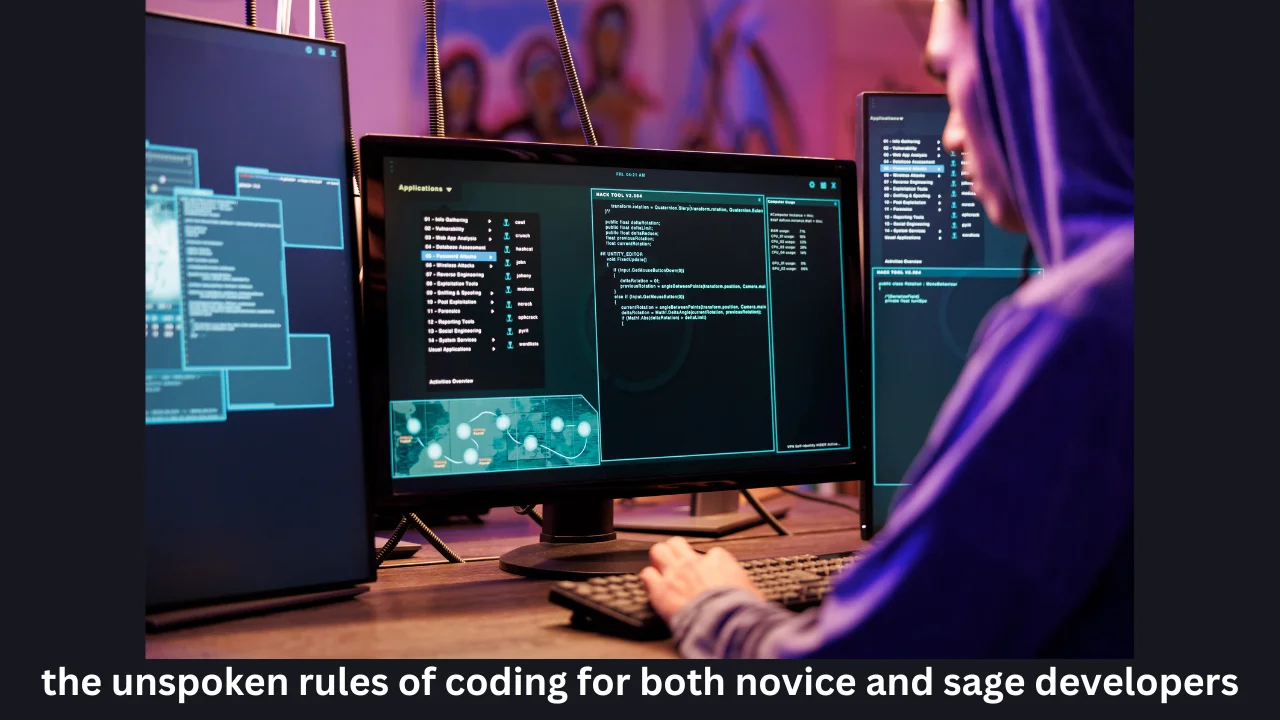The Unspoken Rules of Coding for Both Novice and Sage Developers

The unspoken rules of coding for both novice and sage developers, a craft of logic and creativity, holds a world of opportunities for anyone willing to dive in. But beyond syntax, functions, and algorithms lies a subtle yet powerful layer of understanding: the unspoken rules of coding for both novice and sage developers. These unwritten principles guide not just how code is written but also how developers approach their work, solve problems, and interact with others.
Whether you’re just starting or a seasoned pro, following these unspoken rules, can elevate your skills, enhance collaboration, and keep your journey exciting and fulfilling. Let’s unravel the secrets to better coding!
Why the Unspoken Rules Matter

Coding isn’t just about writing lines of code that machines can interpret; it’s about creating solutions that people can maintain, understand, and build upon. Following the unspoken rules of coding for both novice and sage developers ensures:
- Cleaner, more efficient code.
- Fewer headaches during debugging.
- Better teamwork and communication.
Adhering to these principles means thinking beyond immediate problems and planning for long-term success.
Start Simple, Think Big
One of the first unspoken rules is to start small. For novice developers, this means breaking problems into smaller, manageable chunks. For sage developers, it’s about keeping things simple while planning for scalability.
Benefits of Simplicity in Code:
- Easier debugging and maintenance.
- Faster onboarding for new team members.
- A cleaner roadmap for upgrades and improvements.
Understand Before You Code
Diving straight into coding without fully understanding the problem? That’s a rookie mistake. Even experienced developers sometimes rush, but the golden rule is: Understand first, then code.
Steps to Better Understanding:
- Define the Problem: What’s the goal? Write it down.
- Visualize the Process: Sketch workflows, diagrams, or pseudocode.
- Ask Questions: It’s better to clarify now than rewrite later.
Comment Sparingly but Wisely
Comments in your code aren’t just for others; they’re for your future self. Over-commenting can clutter your code while under-commenting can lead to confusion.
Best Practices for Comments:
- Explain why something is done, not just how.
- Avoid repeating what the code already states.
- Keep it concise and relevant.
Example:
Python
Copy code
# Incorrect:
x = x + 1 # Add one to x.
# Correct:
x = x + 1 # Increment to account for user input adjustment.
Collaborate, Don’t Compete
In the coding world, teamwork makes the dream work. Whether you’re a novice or an experienced developer, collaboration fosters learning and innovation.
Tips for Effective Collaboration:
- Share knowledge freely.
- Respect diverse perspectives and coding styles.
- Use tools like Git to manage shared codebases effectively.
Embrace Failure as a Learning Opportunity
Mistakes happen. Bugs pop up. Deployments crash. These experiences are part of the journey for both new coders and seasoned developers.
How to Handle Failures:
- Debug Systematically: Break down the problem and test small parts.
- Reflect on the Cause: Understand what went wrong and why.
- Document Lessons Learned: Avoid repeating mistakes in the future.
Keep Learning: The Key to Staying Relevant
Technology evolves faster than we can blink. Staying stagnant is not an option for anyone in the coding world. Following the unspoken rules of coding for both novice and sage developers involves continuous learning.
Strategies for Lifelong Learning:
- Read Documentation: Master the tools you use daily.
- Join Coding Communities: Platforms like Stack Overflow and GitHub are goldmines for learning.
- Experiment with New Languages: Even sage developers can expand their toolkit.
Write Code for Humans, Not Just Machines
A common trap is writing code that only a compiler can understand. But maintainability matters, especially for projects involving teams.
Tips for Writing Readable Code:
- Use meaningful variable and function names.
- Stick to a consistent style guide (e.g., PEP 8 for Python).
- Avoid overly complex one-liners.
Example:
Python
Copy code
# Hard to read:
x = [y for y in range(10) if y % 2 == 0]
# Easier to understand:
even_numbers = [number for number in range(10) if number % 2 == 0]
Don’t Reinvent the Wheel
It’s tempting to solve every problem from scratch, but a wiser approach is leveraging existing libraries, frameworks, or solutions.
Benefits of Using Pre-Built Solutions:
- Saves time and effort.
- Reduces errors with well-tested tools.
- Frees up energy for solving unique challenges.
A Table of Common Do’s and Don’ts
DoDon’t
Write clean, modular code. Hard-code values are everywhere.
Use version control (e.g., Git). Forget to document changes.
Test your code thoroughly. Assume it works without testing.
Keep learning and adapting. Stick to outdated practices.
The Role of Patience in Coding
One of the most understated rules is learning to be patient. From debugging to mastering new languages, coding is a marathon, not a sprint.
How to Cultivate Patience:
- Take breaks when frustrated.
- Celebrate small wins to stay motivated.
- Remind yourself: that even experts were beginners once.
Tools to Simplify Your Coding Journey
Both novice and sage developers can benefit from tools that make coding smoother and more efficient.
Essential Tools for Every Developer:
- Code Editors: Visual Studio Code, Sublime Text.
- Version Control: Git, GitHub.
- Debugging Tools: Chrome DevTools, Postman.
- Collaboration Platforms: Slack, Trello.
Conclusion: Unlock Your Potential with the Unspoken Rules
The coding journey is as much about personal growth as it is about solving technical problems. By following the unspoken rules of coding for both novice and sage developers, you can create not just functional code but also a fulfilling career.
From understanding problems to writing human-friendly code, these principles guide you to be a better coder and collaborator. Keep learning, experimenting, and embracing the challenges that come your way. After all, every bug fixed and every algorithm mastered brings you one step closer to coding excellence.
So, are you ready to embrace these unspoken rules and unlock your true potential as a developer? Let’s code the future together!





